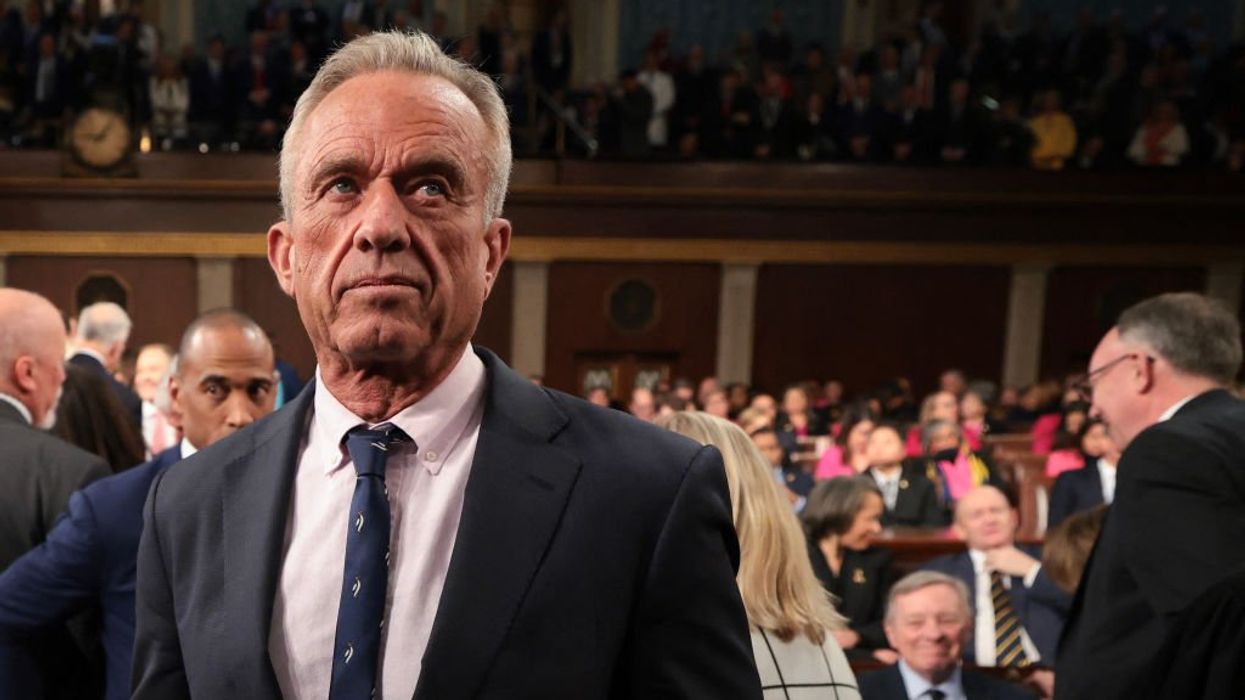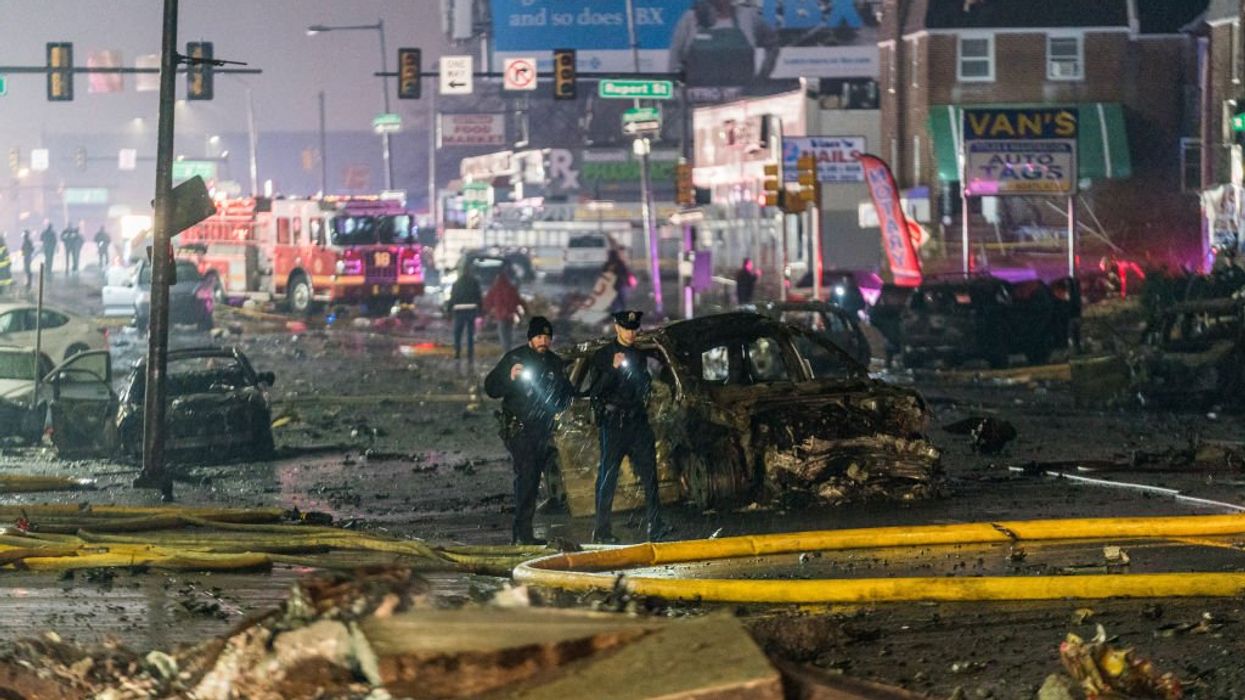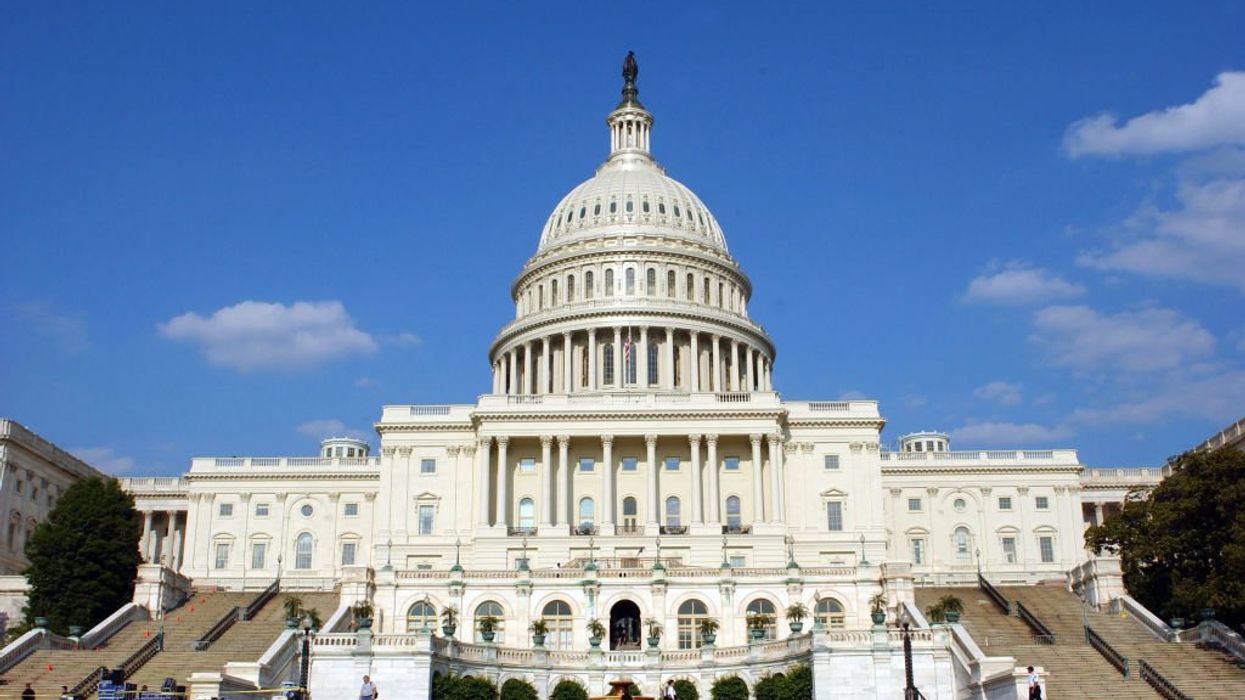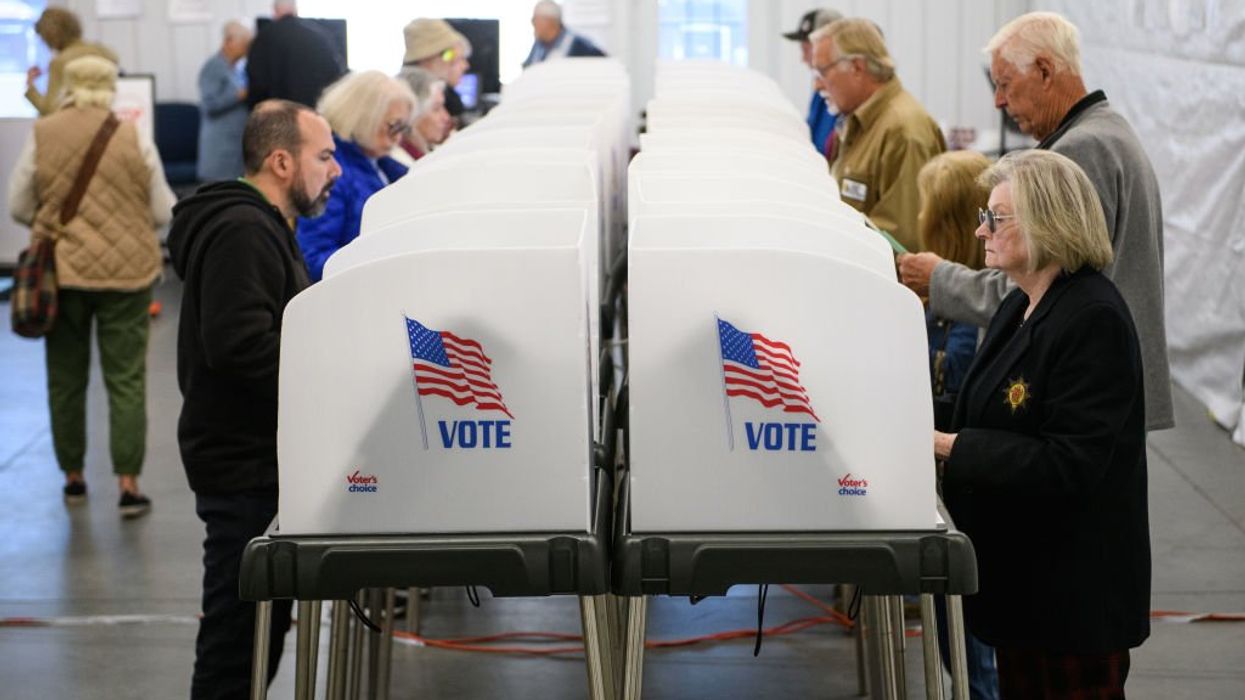The American Constitution is the longest running constitution in the history of the world for a reason: It was brilliantly written. Yet we're seeing its light flicker out due to power-hungry political elites who no longer follow the will of the people. This is the real reason the Second Amendment was put into the Constitution --- to stop a tyrannical government. Hopefully, we never get to that point because our Founders placed emergency stops along the way. One of them, is the Convention of States, outlined in Article V of the U.S. Constitution.
RELATED: Impeach Clinton to Bar Her from Holding Federal Office. It’s Constitutional.
Last weekend in Colonial Williamsburg, Virginia, a mock Convention was held with 137 delegates from all 50 states. The simulated Convention allowed participants to practice the process of invoking Article V, which has never been attempted in the history of the U.S.
The Convention delegates passed amendment proposals on the following six ideas:
1. Requiring the states to approve any increase in the national debt
2. Term limits on Congress
3. Limiting federal overreach by returning the Commerce Clause to its original meaning
4. Limiting the power of federal regulations by giving an easy congressional override
5. Require a super majority for federal taxes and repeal the 16th Amendment
6. Give the states (by a 3/5ths vote) the power to abrogate any federal law, regulation or executive order.
Mark Meckler, one of the nation’s most effective grassroots activists and a national leader for the Convention of States, joined The Glenn Beck Program on Wednesday to share the fascinating and promising results experienced at the Convention.
"It was like sitting and watching history. I mean, it was really extraordinary," Meckler told Glenn.
While Americans have been arguing over the 2016 presidential candidates, Meckler and his team have been working behind the scenes on solutions for real change to put power back in the hands of the American people --- exactly where the Founders' intended it.
What can you do? Get informed, excited and involved in this credible effort to harness the power of the federal government.
SIGN THE PETITION in favor of invoking Article V of the U.S. Constitution for a Convention of States.
Read below or listen to the full segments for answers to these revolutionary questions:
• Did the delegates wear powdered wigs?
• How many states must pass a resolution to hold a Convention?
• What are the safeguards to stop a runaway Convention?
• What percentage of Americans want a Convention of States?
• What is the origin of the terms "right" and "left"?
• How many states must participate to ratify changes?
• What percentage of Americans say the federal government is too big?
Listen to these segments from The Glenn Beck Program:
Below is a rush transcript of this segment, it might contain errors:
GLENN: Around the same time we were doing our constitutional convention, there was a revolution fomenting overseas. And King Louis was either stupid or just so detached that he didn't really see what was coming. And he called everybody together -- all the lords and the ladies and everybody else, and said, "Okay. Come on, everybody. Let's get together. And let's open up. And let's look at how we can do things better." Well, it started to go awry and started to go the way he didn't like it. And instead of quashing it or getting deeper into it and say, "Okay. Now, let's see and really work it out," he just instead decided the next day to lock the doors. And so all the people showed up, and the doors were locked. And that was just, you know, oh, well. It's over.
But they didn't like that. The people who were attending the convention didn't like that at all. So they just said, we're going to meet on the tennis court. And they took what was called the tennis court oath. And this is how we get left and right and everything else. That thing spiraled out of control and went into the French Revolution.
There's hopefully no way that anything like that happens at the Convention of States. And that's why what happened this weekend was so important. Because there's a lot of concerns that you start opening up the Constitution, and maybe things can spiral out of control. Again, our Founders were brilliant, and they knew there are safeguards. We'll put them in here. So it's a very controlled situation.
Mark Meckler is with us from the Convention of States. You were in Williamsburg. What was it like to do a -- the possibility of a real convention, constitutional hood-up in Williamsburg?
MARK: It was like sitting and watching history. I mean, it was really extraordinary, Glenn. You had delegates from -- or, commissioners from all 50 states. A hundred thirty-seven commissioners flew in from all over the country, most of them sitting legislators, some retired state legislators, some just citizen delegates from the state. But the majority were citizen -- or, were state legislators. And, man, I will tell you, the first day when they entered that room, the placards up for every state, huge American flag, 12 by 24, behind the dais. And when the Georgia -- the interim president from Georgia, Representative Brockway gaveled that thing to order, it was incredible the electricity in the room.
PAT: Did you guys wear powdered wigs just for fun?
MARK: You know, they had them there in Williamsburg if we had wanted them. But everybody seemed to opt out. It was a little weird.
PAT: Yeah. Weird.
GLENN: So let's go over this: Convention of States, Article V of the Constitution, has it ever been invoked before?
MARK: Never been used.
GLENN: And it has never been used because it is really kind of a last resort, break glass in case of an emergency kind of thing.
MARK: Well, and also the bar is very high. It's difficult to call it a convention. It takes 34 states passing essentially identical resolutions to get to the point where you can actually have a convention. Two-thirds of states have to do it. That's a high bar to get to, to get two-thirds of states to agree on anything.
GLENN: Why do you think this is going to happen this time?
MARK: Because the American people are united. And I know that sounds outrageous based on the current election we're having and the way things are going. But here's what they're united around, Glenn: Seventy-two percent of Americans say that the federal government is too big and does too much. That doesn't matter whether you're Republican or Democrat and what your ideology is, you're sick of the federal government in your business, in your face. That's just true for most Americans. And it's been true and growing for a long time. Fifty-two percent of Americans today say that the federal government has actually lost its legitimacy. It's not a legitimate representative of the American people anymore.
GLENN: 52 percent.
MARK: 52 percent. That is, by the way, a higher number by far than supported the American Revolution back in Revolutionary times.
GLENN: Oh, yeah. Big time.
MARK: And so what it means is that Americans are not looking to Washington, DC, anymore. They're looking away from Washington, DC. They're ready to take their power back, and Article V is the mechanism that the Founders gave us to do that.
PAT: How many states do you have on board so far?
MARK: So eight states have now passed the resolution. Thirty-eight states will be taking it up come January of 2017.
GLENN: You need 30?
MARK: You need 34.
PAT: So we need 26 more.
MARK: Twenty-six more, yes, sir.
PAT: So what do you say, Mark, to the people who say, "Well, what about a runaway convention? How do you safeguard against that?" Everybody is afraid they're going to open up the Second Amendment and change that and take that away and all of that. How do you -- how do you respond to that?
MARK: Sure. Well, let me start at the backside, which is the ultimate safeguard the Founders put in. It takes 38 states, or three-quarters of states, to ratify anything that comes out of convention. That's a super high bar. Right? Super, super majority.
So when you put the math on its head, what it means is that it takes only 13 states to stop anything that those of us sitting here wouldn't like. So I want you to think about that: One of the things I hear all the time from people who are against this -- and it is a small minority, but a vocal minority of people against this.
PAT: They really are.
MARK: They say, "We're going to lose our Second Amendment. They're going to take away our guns in this convention." So I want you to imagine this: Thirteen states can stop anything that comes out of convention. That means, in our case, the 13 most conservative states.
So here's what you have to believe if you believe in this runaway with a stuff. You have to believe Texas, Georgia, Alabama, Tennessee, the Carolinas, Florida, Nebraska, the Dakotas, they're going to vote to take away your guns. You have to believe that. I've been in 40 states in the last two years, most of them in the state legislatures --
PAT: They're not going to.
MARK: -- those people are not going to vote for anything that would limit your liberty. So the threshold is so high, it is impossible to pass anything that would limit --
GLENN: So there's two really high thresholds. Thirty-four states need to say, yes, we'll go. And then -- then they hash whatever it is out. Then it goes back, and 38 states have to say, "Yes, we're going to do that."
MARK: That's correct.
GLENN: Holy cow.
MARK: Meaning it takes a mass majority of public opinion to get something out of convention and then to the states and then ratified.
And, remember, the way ratification works is important. I spent a lot of time in state legislatures. The things that they're very best at is doing nothing. They're experts at nothing.
GLENN: Yeah.
MARK: And so in order to not ratify an amendment, what they need to do is nothing. No committee hearings. They don't have to vote it down. They don't ever even have to talk about it. If they don't take it up, they don't join the ratification. So getting something ratified is an exceptionally high bar.
PAT: Yeah, ask the equal rights people about that. The ERA amendment that never passed.
GLENN: So there's two things. That gives me great safeguards. But that also makes me say, "Crap. They're not going to do any of this."
STU: Right. Why would they do anything that would help us as far as increasing our liberty, when only 13 liberal states can block it?
GLENN: I had a -- I read a great line from somebody -- and I don't agree with this at all, but they were like, if voting really did something, the government would have banned it.
(chuckling)
MARK: I think they would like to ban Article V.
PAT: Yes.
MARK: And they've been trying with this leftist propaganda for a long time to turn the right against itself and to stop us from using it.
But to answer your question, here's why: Because the only things that are going to come out of convention are the things that have majority -- super majority support. And let me give you some examples.
For over 30 years, the balanced budget amendment, in one form or another, has polled at about 80 percent with the American public.
So when's the last time the federal government cared about a balanced budget amendment. Right? They don't. But the American public, by massive numbers, wants it. The American public by massive numbers wants to term limits. Whatever you think of term limits, about 80 percent of Americans say Congress should be subject to term limits. We tried in the late '70s. What happened is we got to 23 states, passed term limits on their congressional delegations. The Supreme Court had the audacity to tell us we can't do it. But we can through Article V.
So these are the kinds of things that are going to come through the process, common sense reforms that the vast majority of Americans agree with and believe in.
GLENN: So what happened at the convention? It's called to order. What happened?
MARK: I mean, the first thing, and to me the most extraordinary thing -- you know, I've been working on this for a long time, so to get to this moment where the convention was actually gaveled to order was extraordinary for me and my staff.
GLENN: It must have been humbling.
MARK: Incredibly humbling. I mean, it gives me chills just to think about it now. The most amazing thing, Glenn, you know, if you've ever sent a kid off to college, that's kind of what it felt like. Like, we got to this moment. The gavel falls. We really had nothing to do with it anymore. It was in the hands of the commissioners. And the delegation from Georgia served as the interim chair because they were the first state to pass this. And they immediately began the voting for the officers at the convention. Ten names went into nomination. It was taken very seriously. Went through three rounds of voting until we got to the majority. And then the representative from Utah, Representative Ken Ivory, was seated as the first president in history of an Article V convention. Really overwhelmingly emotional to watch that take place.
GLENN: Now, this doesn't count. So this was mock. So when you say he's the first one seated for an Article V convention, I mean, is that a historic moment? Really? You know it is --
MARK: Well, it is because nobody has ever done simulation in America. In fact, they said it couldn't be done. Three years ago, we were told it was crazy and it couldn't be done.
GLENN: And you were doing the simulation just to see, "Okay. How does this thing work?" So when we get to the real one -- this isn't like some mock, hey, we're making a documentary. This is a trial run to work out the bugs and see where the pitfalls are.
MARK: As a business guy, you understand proof of concept as well as anybody, right? So you come up with your idea, you work on it, you develop it. At some point, you got to put it on the table and see if it works.
GLENN: What did you learn?
MARK: We learned a lot. I learned -- I think the hardest thing -- I had a delegate come up to me and say this. She said, "You know, everybody worries about a runaway convention. We're going to be lucky if we can crawl." You get 150 representatives from all 50 states in a room and get them to agree, is this the word "and," or does a comma go there? That's a big deal. It's going to be slow. It was incredibly deliberative, much more deliberative than I expected. Many delegates came up to me and said this, "You know, I keep having to remind myself, this is not the real thing." That's how serious they were. These folks understood that they were dealing with the Constitution, our founding charter, the most important thing that they will ever do as a state legislator. And they took it that seriously. I was really heartened by that.
GLENN: What you don't have -- I would assume, what you didn't have is any kind of -- I mean I hate to sound conspiratorial, but any kind of Soros influence. When this becomes real, you know you will have outside pressure that do not want this to happen. And many funneled. And campaigns and everything else. You had a group of generally like-mind people together?
MARK: I would say generally. We certainly had some Democrats. We had some independents. Our co-sponsor in Ohio was a Democrat from the inner city in Ohio there. So there was a mix.
GLENN: So it was generally what you would have -- what you're expecting to have.
MARK: I think -- no. To be fair, what you're pointing out is true, which is, at the real convention, you'll have what I would call the hard, radical left.
GLENN: Yes.
MARK: And I think they will be doing more than what you described, not just trying to upset the process. But they will be attempting to hijack the process.
GLENN: Yes.
MARK: They're not engaged right now because they don't like Article V.
GLENN: Okay. So when that happens, did you learn anything on how to stop that?
MARK: Yeah, we did. Because we actually ran, according to a set of convention rules, drafted by the leading expert in the country on Article V, Rob Natelson, it ran according to those rules. What we saw is, everything is orderly, everything is smooth. And, you know, when people are out of order, somebody raises a point of order, and they're stopped. So the idea that somebody is going to be allowed to raise their hand and say, for example, bring up the Second Amendment, it just couldn't happen. Because you're going to have -- remember 31 states right now, both houses controlled by Republicans, somebody is going to raise their hand and say, "Point of order, that's not within our mandate."
GLENN: Let me take a break here. And I want you to answer this question when we come back: None of -- none of the representatives for the original Constitution were going in to draw up a new constitution. All of them were going in to fix the Articles of Confederation. And that didn't happen. So I want you to tell me the difference between those two when we come back.
[break]
GLENN: Okay. So back with Mark Meckler from the Convention of States. And you can go to ConventionofStates.com. We were just talking off the air.
In speaking to Mark over the last few, I believe this is the last best hope for America. I believe this is the future. You're going to save it, it's going to be saved this way. And I just told him off the air, and I want people to hear it, I am 100 percent in. And you tell me how we can help, and I am there. Because I really believe in this and really believe, if we're going to save the republic, it has to be done constitutionally. The Founders gave us this. I don't know if they saw, you know, what we saw on Sunday night coming our way. But they saw something like that. And we need to -- we need to band together, all of us, left and right, to get this done.
Tell me why this doesn't turn into France and the tennis court or the Articles of Confederation.
MARK: Sure. Let's go to 1787. Because that's the place where most of the runaway folks go.
In 1787, we hear the story that these incredible men that gathered in Philadelphia went to amend the Articles of the Confederation. They exceeded their authority. The convention essentially ran away, and we got the new Constitution. That's obviously divinely inspired and an incredible blessing, but they were out of bounds, is what we hear over and over.
And if you had said that ten years ago, all history would have said you were correct. Today, new research has been done. And you can read these on our website. You go pull the commissions, the actual pieces of paper that these delegates or these commissioners went to Philadelphia with, and read what their authority is. And I'll tell you, I'll quote from those commissions because all of them have virtually identical language.
The language was this, that the commissioner is granted all authority necessary to render the federal Constitution adequate for the exigencies of the Union. Period. Stop. End.
No limitation on their authority. So what does it come from this idea that it was a runaway convention?
GLENN: Well, some didn't want to do it. Some didn't want to do it. They were making a case -- basically, New York was making a case for Bork.
MARK: And New York was one of two delegations that did not have that authority. There were two delegations that did not.
So the question is: But where does this widespread idea from the runaway come from? And like most bad ideas, it comes from Congress.
Because here's what's happened: The majority of states had already designated their commissioners, already given them their commissions, already given them the authority. And Congress issued what was essentially an advisory opinion and does what congressmen do and said, "Hey, the states are doing something. We ought to go along. It looks like they're going to do this without us, no matter what." And they issued this proclamation for a convention.
Important to note, in the articles, no authority to call a convention. In the articles, no authority to propose amendments, period. Congress had no authority. So they issue this proclamation, and they say to amend the Articles of Confederation. But if you read the full proclamation, it also contains the language, and take any and all actions necessary -- so those men -- it's outrageous. I just want you to think about this.
GLENN: Hang on. I have to take a break. You can finish that. And what they actually did in Williamsburg this weekend.
[break]
GLENN: All right. So Mark Meckler is here. He's talking about the Convention of States. ConventionofStates.com. This is Article V of the Constitution. This is a way to get the Congress to start listening to the people. And it's going to be very narrow. It is -- it's controlled. It is -- you can't just go in and -- and hijack the thing because, as you were saying, the Founders even and the Articles of Confederation, when they called the constitutional convention together, they had the authority to do it, except for two states.
Everybody else had the authority to do what they did. What -- first, let's start with -- where did you -- what did you do this weekend? What actually passed this weekend in this mock convention?
MARK: So it's important to remember what can be discussed in the first place. What the limitations are. So there are three subject matter areas. The first is imposing any kind of fiscal restraints on the federal government. So that would include things like a balanced budget amendment, imposing generally accepted accounting principles on the federal government, instead of unicorn-and-rainbow accounting, like they use, outrageous things like that. Second is anything that would impose scope and jurisdiction on the federal government. In other words, reimposing enumerated powers on the federal government, stuffing the beast back into the constitutional box. And the third area is imposing term limits. And that can include, by the way, which I'm in favor of, term limits on the Supreme Court and the whole federal judiciary.
GLENN: And any of the apparatus State Department?
MARK: Absolutely. Anybody in the federal government can be termed, according to this.
GLENN: Okay.
MARK: So what happened was we got into the main convention, elect the officers, and then they broke out into committees, three committees of roughly equal size, roughly 50 people per committee, a representative from each state on each committee, and they brought amendments with them that they had crafted back in their home states. We also had grassroots activists from all over the country propose amendments. We had over 1,000 proposals came in. So those were sorted and grouped together and provided to the commissioners in advance. And so they had something to start from, much like it would be in a real convention. Because these commissioners are going to come with recommendations from their own state.
GLENN: The people, yeah.
MARK: Yeah, I mean, for example, in Texas, Governor Abbott has proposed the Texas Plan. He has nine amendments he's proposed. Texas is going to bring its own plan when there's an actual convention.
(laughter)
GLENN: If Abbott is doing it, I'm ready to sign on.
MARK: Well, it's some great amendments. And he's stepped up, and he's become a leader in this movement nationally. He wrote a book about it. He's doing a great job. By the way, your lieutenant governor here in Texas signed on as well.
GLENN: Fantastic guy.
MARK: Lieutenant Dan Patrick about a week ago --
GLENN: Oh, Dan Patrick.
MARK: I think you're thinking Ken Paxton. Good friend of ours. Great supportive guy.
GLENN: Yeah, yeah.
MARK: So all the leaders are signing on here in the great state of Texas, for obvious reasons.
So what came out of it were six amendments. But the process is really important to me, Glenn. Because what happened was each committee had the ability to propose three because we were limited by time. So we limited them to three each.
What I thought was so great is that they didn't each propose three. They were so serious that one of the committees could only get to two. And so two proposed three. One proposed two. We ended up with eight on the floor. They go to full debate. The committees start presenting their reports. And one of them, out of the eight, got tabled. They just couldn't come to an agreement.
So here we are, we're doing a mock convention. It's not even the real deal. They're so serious about it, they won't vote for something that they don't absolutely believe in. They weren't willing just to put something out there. One of them gets tabled. One gets voted down outright. I mean, to me, that was the proudest part. Not what they did. But what they didn't do. The idea of a runaway -- these guys wouldn't let it runaway, and it wasn't even real.
And so we got things like -- we got a term limits amendment out. And, frankly, I didn't really love the term limits amendment. It was 12 years in the House and 12 years in the Senate, for a total of 24 years. To me, I mean --
GLENN: Jeez. Yeah, let's really crack down.
MARK: Exactly. So, but remember, you're dealing with a bunch of state legislators. They don't necessarily love term limits.
GLENN: Yeah.
PAT: Would you go with 12 years in the House or 12 years in the Senate?
MARK: I would prefer something like that.
PAT: Yeah.
STU: I'd take that. I would take it at this point. At least you would get rid of the McCains. The long-time -- the Robert Byrds.
MARK: Absolutely.
PAT: Yeah.
GLENN: Oh, my gosh. When you're rolling somebody in on an iron lung, it's time to go.
STU: Twelve and 12, I can deal with that. It's only two terms in the Senate.
PAT: Right. Two terms in the Senate, and it's six terms in the House.
STU: Six terms in the House. But, I mean, that's not ridiculous.
MARK: But what was so great about it was the debate. And you can actually watch this online. The entire uncensored debate is online.
PAT: Oh.
GLENN: Where is it?
MARK: It's at ConventionofStates.com. Right there on the front, you can look at the COS simulation. You can watch as much or as little as you want, watch your state delegations debate. It's incredible. So they're so serious. And they're arguing, "What's the right amount of time?" They're arguing about the power of the bureaucracy, if you have shorter term limits. And how the lobbyists and the bureaucrats become stronger and the representation is less. The debate was nothing great than watching great statesmen and women from all over America debate the most important issues of our time. To me, the process more than the result was extraordinary.
PAT: So you think the two things that would really be on the agenda is the term limits -- and what was the other one?
MARK: I think term limits and balanced budget are easy.
PAT: Term limits and balanced budget.
MARK: Those are easy. I think another one is easy -- which wasn't really discussed in this convention, is a single subject amendment. We're tired of 2,000-page omnibus bills.
STU: Yes.
PAT: Yes.
STU: Yes.
PAT: I think that's really important. Really important.
MARK: That's 95 percent with the American people. It's easy to get it done.
PAT: The other thing that should be done is make them go back to their districts and stay there.
MARK: I'm totally -- call that the virtual Congress. We have the technology. They should be able to --
PAT: Yes. Yes.
GLENN: And it's better for security. It's better for lobbying. You don't -- they're not all in one place, like, you know, shooting fish in a barrel. The lobbyists are going to spend a lot of money traveling --
PAT: It makes it really tough for lobbyists to --
MARK: Well, and forgive me for saying so. If you're an environmentalist, it's a much lower carbon footprint to keep them at home in their own districts. Right?
PAT: Be able to sell that to leftists.
JEFFY: Yeah.
MARK: You know, another thing that came out of it that I thought was great, something they called the abrogation amendment, allowing three-fifths of states to vote to overrule any decision of the Supreme Court or any rule, regulation, or authority coming out of Congress or the executive.
So an executive order that we don't like, three-fifths of the states vote, it's gone. It's off the table. So return the power to the people.
PAT: I love that. Love that.
GLENN: Wow, is that great. That one passed?
MARK: That's one of my favorite -- that one passed. That came out.
GLENN: Wow.
MARK: Here's another one that passed that I thought was pretty extraordinary. I think maybe more limited chance in an actual convention, the repeal of the Sixteenth Amendment passed out of convention. Extraordinary.
GLENN: Wow.
MARK: There was a huge debate around what to do after the repeal of the Sixteenth Amendment. The FairTax was suggested and debated really strongly on the floor. A long debate. And eventually they struck the FairTax, and they said, "Look, we're just going to say, we got to get rid of the federal income tax. You know, we'll figure it out legislatively what to replace it with." But the federal income tax went in the convention.
GLENN: Holy cow.
STU: So this is an interesting thing. Because let's just say this were to happen. Because the Sixteenth Amendment is directly from hell, as we know.
PAT: Southern hell.
STU: From southern hell. So it comes out and so now there's no income tax.
What if you can't pass something else to replace it? We have nothing to fund the government? Wouldn't that be an argument against this process?
GLENN: Well, first of all, it leaves here, and then the debate really starts. Hopefully this will be, you know, watched by everybody as it's going on.
STU: But if they can't pass the FairTax or whatever would replace it --
GLENN: Right. But you would have enough time between the convention and the states approving it.
PAT: Yeah.
GLENN: And then the government responding to what the states just approved, that you would be having that conversation.
MARK: Well, and this is what's important. So politicians are not generally known as brave souls. We don't really see much leadership out of politicians. They move when they're forced to move. And so if we want our politicians to make tough decisions, we have to put them in a situation where they are required to make tough decisions, which is what this particular situation, the repeal of the Sixteenth Amendment --
PAT: It would certainly do that, yeah.
STU: Real quick, Glenn.
Do you think there's a possibility, if you got to the point where actually the convention was going on, and these proposals were on the table like, "Hey, we need to -- you know, we're going to get rid of the Sixteenth Amendment," is it potentially possible that Congress acts on their own to offset that? So they say, "Well, wait a minute. Well, maybe we should cut taxes. Maybe we'll do term limits here instead of that." To try to stop you guys and maybe do some of the work for you. Possible?
MARK: I fully expect -- not that it's possible -- I expect that will happen. And we're prepared for that. We're preparing our grassroots, and we're preparing the state legislators. Our attitude going into this process is: Too late for Congress. And, frankly, what we say is we don't need no stinking Congress.
Because if they start to propose these and play those games, our people know those games are coming, and we will simply ignore them. We're not interested in what they have to propose. Once the process starts, they're out of the loop. They chose to be locked out by not taking action. Our people know the games are coming. The state legislators know the games are coming. And so our intent is to ignore them because they will come up with a balanced budget amendment that has so many loopholes in it, that it's meaningless. And then they'll tell us, "Look, we already did it."
STU: But does that win over states 35, 36, 37, 38, that are barely within the process and not hard-core dedicated? I mean, we saw this with -- what was it? Stupak with the abortion funding in Obamacare. You know, he was all, "I will never vote for Obamacare. Or, you know, funding for abortion." And then the president was like, "Well, what if I write it down on this Post-It note in the Oval Office." And he's like, "Oh, okay. Now I'm going to vote for it." The guys are -- the ones that are winnable --
GLENN: By the way, how is that working out for him?
STU: It worked out really well. Worked out really well.
But, I mean, those guys will be won over by some of this stuff, won't they?
MARK: Well, here's the issue: What we're talking about is not a theoretical exercise. What we're talking about is the greatest act of political muscularity in American history. And I don't say that out of ego. I'm not doing it. And it's not done yet, to be clear. It's up to the Lord whether it will actually get done. But, remember, when 34 states passed, that means that millions and millions and millions of people want this to happen. Politicians not being brave souls are very good in jumping in front of a parade. And we already see this in states where we gain more and more support, as politicians start saying, you know, this convention idea, I've always -- I was talking about this back in high school. It's incredible.
And this is literally what I expect to happen. As we move towards 30, 31, 32 states, you're going to see politicians who have been against it all along are now in favor, and they're going to champion it. It's starting to have electoral consequences for folks. We don't engage in direct electoral activity. We have 1.45 million activists. We literally now have activists in every single state legislative district in the United States of America. That's never been done before in any project in American history, as far as I'm aware. So what these people are doing is, they are putting just bald political muscle pressure on their representatives.
My goal is way beyond Convention of States. The goal is restore self-governance in America
GLENN: Amen.
MARK: The goal is to answer this question: Who decides? That's the question facing America. It's not what we should do.
GLENN: So let me ask you this, because one of the biggest who decides things is the Commerce Clause. Did they do anything on the Commerce Clause?
MARK: They did. They redefined the Commerce Clause and took it largely back to what it was intended to be, as a very limited, enumerated power. You're going to -- I know you're a Commerce Clause guy. You're going to love it. You can go to the website and look at the exact language. They did an extraordinary job drafting Commerce Clause limitations.
GLENN: Just that changes everything. EPA. Everything.
MARK: Department of Education. Department of Energy. Commerce.
GLENN: Everything changes.
STU: Any one of these. Term limits does that, I think. Balanced budget probably does that. Sixteenth Amendment definitely does.
GLENN: Yeah, I've got about a minute here. If people want to get involved, they just go to the ConventionofStates.com?
MARK: Go to ConventionofStates.com. Sign the petition. That will link you with your district. You'll get connected with your district captain. You can volunteer at any level. Do very simple things like just sign the petition or get involved and start organizing your neighbors and your friends. We've got all kinds of training tools. We're training the most sophisticated active grassroots army in America. We are going to answer the question, who decides? We decide. And you can go to ConventionofStates.com. That's how folks get involved.
GLENN: I am in 100 percent. You let us know how we can help you. Please get involved. Convention of States. Can you tell me quickly what states have -- what states you're close in.
MARK: I would say some of the most important states -- I would say the most important state in the fight right now, Texas.
GLENN: We haven't decided yet?
MARK: You have not. And we got close in the last session. We made it through the House. We got stopped by a couple of senators in the Senate, last session. Of course, we didn't have Governor Abbott on board or the lieutenant governor on board, so it's going to be different. Also, last session we had 21,000 activists in Texas. Now we have 97,000 activists in Texas. So the army is on the field, and we intend to steamroll through the Texas legislature this year. That's my number one target because as Texas goes, so go many in the states.
GLENN: Oh, big time. Okay. Good. Please, get involved. Texas: Join me by signing today. ConventionofStates.com. ConventionofStates.com.
Thank you so much. We'll talk to you again early and often, I hope.
Let me tell you about our sponsor this half-hour. We're so grateful for them providing the opportunity for us to meet with you every day. It's RealEstateAgentsITrust.com. When you need to sell your house, you need a real estate agent that is competent, you that has a plan. Has a good track record. Is honest. Is going to tell you what the truth is about. Your house and not going to give you pie in the sky stuff.
[break]
GLENN: I tell you, I got a new slogan: Never Trump, never Hillary, never mind. They just said that a minute ago. I love that. Never Trump, never Hillary, never mind. Don't need it. Don't need it. We weren't supposed to have a king. Why are we fighting for a king? The people need to take care of this. And the people -- I'm telling you, you get this done, Washington will be shook to its core.
PAT: Yep.
GLENN: To its core. And you have a chance of really saving the republic. I am all in.
STU: I mean, seriously, you get one of those things done -- I mean, we would -- I would be this dedicated to something like this, if it was just for one amendment out of that grouping that we just talked about.
GLENN: Did you hear what they said?
PAT: Yeah.
GLENN: If those things passed, you would fundamentally strip Washington of so much of its power. You would just strip it of its power.
PAT: Yep.
GLENN: It would be amazing.
STU: You wouldn't have to worry about the presidential campaign.
GLENN: No. They wouldn't have to spend a billion dollars on advertising.
PAT: And they're already thinking about my favorite thing, and that's the virtual Congress, doing it from their districts, which you got to have them next to their people so the people can control them.
JEFFY: Yes.
GLENN: Yeah. Love it. Common sense. Common sense.
PAT: Yep.
GLENN: I love it. ConventionofStates.com. ConventionofStates.com.
Featured Image: Image courtesy of Convention of

















